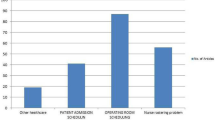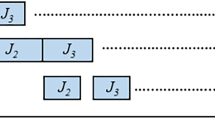Abstract
This paper addresses single-machine scheduling problems with truncated learning effects. The objective is to determine the optimal job schedule such that the makespan, the total weighted completion time and the maximum lateness are to be minimized. All the considered problems are NP-hard; hence, for each problem, we propose the heuristic and branch-and-bound algorithms. Extensive numerical experiments validate the efficiency of the proposed solution algorithms on a set of randomly generated instances.

Similar content being viewed by others
Data Availability
The data used to support the findings of this study are available from the corresponding author upon request.
References
Azzouz A, Ennigrou M, Said LB (2018) Scheduling problems under learning effects: classification and cartography. Int J Prod Res 56:1642–1661
Biskup D (1999) Single-machine scheduling with learning considerations. Eur J Oper Res 115:173–178
Cheng TCE, Kuo W-H, Yang D-L (2014) Scheduling with a position-weighted learning effect. Optim Lett 8:293–306
Framinan JM, Leisten R (2003) An efficient constructive heuristic for flowtime minimization in permutation flow shops. Omega 31(4):311–317
Geng X-N, Wang J-B, Bai D (2019) Common due date assignment scheduling for a no-wait flowshop with convex resource allocation and learning effect. Eng Optim 51(8):1301–1323
Hardy G, Littlewood J, Polya G (1967) Inequalities. Cambridge University Press, Cambridge
Hsu C-J, Kuo W-H, Yang D-L (2011) Unrelated parallel machine scheduling with past-sequence-dependent setup time and learning effects. Appl Math Model 35:1492–1496
Huang X (2019) Bicriterion scheduling with group technology and deterioration effect. J Appl Math Comput 60(1–2):455–464
Huang X, Wang J-J (2015) Machine scheduling problems with a position-dependent deterioration. Appl Math Model 39(10–11):2897–2908
Jiang Z, Chen F, Zhang X (2022) Single-machine scheduling problems with general truncated sum-of-actual-processing-time-based learning effect. J Comb Optim 43:116–139
Kuo W-H, Yang D-L (2007) Single-machine scheduling with past-sequence-dependent setup times and learning effects. Inf Process Lett 102:22–26
Lai K, Hsu P-H, Ting P-H, Wu C-C (2014) A truncated sum of processing-times-based learning model for a two-machine flowshop scheduling problem. Human Factors Ergon Manuf Service Ind 24:152–160
Lawler EL (1973) Optimal sequencing of a single machine subject to precedence constraints. Manag Sci 19:544–546
Lee W-C (2011) A note on single-machine scheduling with general learning effect and past-sequence-dependent setup time. Comput Math Appl 62:2095–2100
Liang X-X, Zhang B, Wang J-B, Yin N, Huang X (2019) Study on flow shop scheduling with sum-of-logarithm-processing-times-based learning effects. J Appl Math Comput 61:373–388
Li L, Yang S-W, Wu Y-B (2013) Single machine scheduling jobs with a truncated sum-of-processing-times-based learning effect. Int J Adv Manuf Technol 67:261–267
Liu W-W, Jiang C (2020a) Flow shop resource allocation scheduling with due date assignment, learning effect and position-dependent weights. Asia-Pac J Oper Res 37(3):2050014
Liu W-W, Jiang C (2020b) Due-date assignment scheduling involving job-dependent learning effects and convex resource allocation. Eng Optim 52(1):74–89
Lu Y-Y, Teng F, Feng Z-X (2015) Scheduling jobs with truncated exponential sum-of-logarithm-processing-times based and position-based learning effects. Asia-Pac J Oper Res 32(3):1550026
Lu Y-Y, Wang T-T, Wang R-Q, Li Y (2021) A note on due-date assignment scheduling with job-dependent learning effects and convex resource allocation. Eng Optim 53(7):1273–1281
Lv D-Y, Wang J-B (2021) Study on resource-dependent no-wait flow shop scheduling with different due-window assignment and learning effects. Asia-Pac J Oper Res 38(6):2150008
Niu Y-P, Wan L, Wang J-B (2015) A note on scheduling jobs with extended sum-of-processing-times-based and position-based learning effect. Asia-Pac J Oper Res 32(2):1550001
Soroush HM (2014) Scheduling in bicriteria single machine systems with past-sequence-dependent setup times and learning effects. J Oper Res Soc 65:1017–1036
Sun X, Geng X-N, Liu F (2021) Flow shop scheduling with general position weighted learning effects to minimise total weighted completion time. J Oper Res Soc 72(12):2674–2689
Wang J-B (2010) Single-machine scheduling with a sum-of-actual-processing-time-based learning effect. J Oper Res Soc 61:172–177
Wang J-B, Gao M, Wang J-J, Liu L, He H (2020) Scheduling with a position-weighted learning effect and job release dates. Eng Optim 52(9):1475–1493
Wang J-B, Liu F, Wang J-J (2019) Research on \(m\)-machine flow shop scheduling with truncated learning effects. Int Trans Oper Res 26(3):1135–1151
Wang J-B, Lv D-Y, Xu J, Ji P, Li F (2021) Bicriterion scheduling with truncated learning effects and convex controllable processing times. Int Trans Oper Res 28(3):1573–1593
Wang J-B, Sun L-H, Sun L-Y (2010) Single machine scheduling with exponential sum-of-logarithm-processing-times based learning effect. Appl Math Model 34:2813–2819
Wang J-B, Wang X-Y, Sun L-H, Sun L-Y (2013) Scheduling jobs with truncated exponential learning functions. Optim Lett 7:1857–1873
Wang J-B, Zhang B, He H (2022) A unified analysis for scheduling problems with variable processing times. J Ind Manag Optim 18(2):1063–1077
Wu C-C, Lee W-C, Liou M-J (2013) Single-machine scheduling with two competing agents and learning consideration. Inf Sci 251:136–149
Wu C-C, Wu W-H, Wu W-H, Hsu P-H, Yin Y, Xu J (2014) A single-machine scheduling with a truncated linear deterioration and ready times. Inf Sci 256:109–125
Wu C-C, Yin Y, Cheng S-R (2011) Some single-machine scheduling problems with a truncation learning effect. Comput Ind Eng 60(4):790–795
Wu C-C, Yin Y, Cheng SR (2013) Single-machine and two-machine flowshop scheduling problems with truncated position-based learning functions. J Oper Res Soc 64(1):147–156
Wu C-C, Yin Y, Wu W-H, Cheng S-R (2012) Some polynomial solvable single-machine scheduling problems with a truncation sum-of-processing-times based learning effect. Eur J Ind Eng 6:441–453
Zhao S (2021) Resource allocation flowshop scheduling with learning effect and slack due window assignment. J Ind Manag Optim 17(5):2817–2835
Zhao S (2022) Scheduling jobs with general truncated learning effects including proportional setup times. Comput Appl Math 41:146
Acknowledgements
This work was supported by LiaoNing Revitalization Talents Program (XLYC2002017). This work was also supported by the National Natural Science Foundation of China (71971165) and the National Key Research and Development Program of China (2021YFB3301801).
Author information
Authors and Affiliations
Corresponding authors
Ethics declarations
Conflict of interest
There are none.
Additional information
Communicated by Hector Cancela.
Publisher's Note
Springer Nature remains neutral with regard to jurisdictional claims in published maps and institutional affiliations.
Rights and permissions
Springer Nature or its licensor (e.g. a society or other partner) holds exclusive rights to this article under a publishing agreement with the author(s) or other rightsholder(s); author self-archiving of the accepted manuscript version of this article is solely governed by the terms of such publishing agreement and applicable law.
About this article
Cite this article
Wang, JB., Zhang, LH., Lv, ZG. et al. Heuristic and exact algorithms for single-machine scheduling problems with general truncated learning effects. Comp. Appl. Math. 41, 417 (2022). https://doi.org/10.1007/s40314-022-02133-5
Received:
Revised:
Accepted:
Published:
DOI: https://doi.org/10.1007/s40314-022-02133-5




